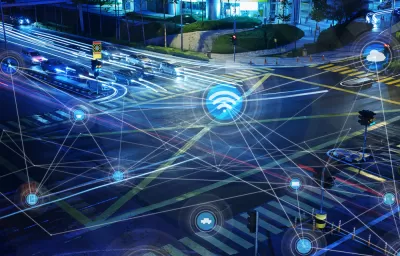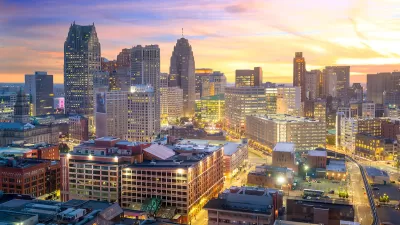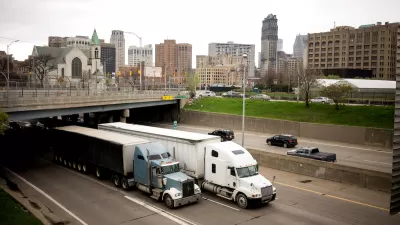The Internet of Things is quickly taking over roads, even before cars start driving themselves en masse around the world.

"General Motors Co. is testing a safety feature in Macomb County to warn drivers that traffic signals are about to turn red," reports Melissa Burden.
According to Burden, the new feature is just one of several new technologies demonstrating southeast Michigan as "a leader in developing 'connected' roads and traffic signals that will 'talk' directly to the next generation of cars."
"The Michigan Department of Transportation and Macomb County are two of the government units working with carmakers and auto suppliers in testing of the life-saving technology," according to Burden. The state's investments include "at least 100 miles of 'connected” highway corridors with roadway sensors for testing in Metro Detroit, with plans to grow to some 350 miles." Macomb County has implemented a series of public-private partnerships "piggybacking off the county’s recent infrastructure investments." The county also has a $13.5 million Communications and Technology Center that "brings together traffic-monitoring, weather-mapping, road-department cameras and a video wall with 40 monitors."
One of the highlights of the article is the explanation of roadside signs with "black-and-white 2D codes" that resemble QR codes—except these signs are designed for cars, not phones. 3M Co. provided the codes and enabled cars can access information like exact locations, warnings about upcoming work zones, and estimated wait times.
FULL STORY: GM testing smart road tech with MDOT, Macomb Co.

Alabama: Trump Terminates Settlements for Black Communities Harmed By Raw Sewage
Trump deemed the landmark civil rights agreement “illegal DEI and environmental justice policy.”

Study: Maui’s Plan to Convert Vacation Rentals to Long-Term Housing Could Cause Nearly $1 Billion Economic Loss
The plan would reduce visitor accommodation by 25% resulting in 1,900 jobs lost.

Planetizen Federal Action Tracker
A weekly monitor of how Trump’s orders and actions are impacting planners and planning in America.

Wind Energy on the Rise Despite Federal Policy Reversal
The Trump administration is revoking federal support for renewable energy, but demand for new projects continues unabated.

Passengers Flock to Caltrain After Electrification
The new electric trains are running faster and more reliably, leading to strong ridership growth on the Bay Area rail system.

Texas Churches Rally Behind ‘Yes in God’s Back Yard’ Legislation
Religious leaders want the state to reduce zoning regulations to streamline leasing church-owned land to housing developers.
Urban Design for Planners 1: Software Tools
This six-course series explores essential urban design concepts using open source software and equips planners with the tools they need to participate fully in the urban design process.
Planning for Universal Design
Learn the tools for implementing Universal Design in planning regulations.
Caltrans
Smith Gee Studio
Institute for Housing and Urban Development Studies (IHS)
City of Grandview
Harvard GSD Executive Education
Toledo-Lucas County Plan Commissions
Salt Lake City
NYU Wagner Graduate School of Public Service





























